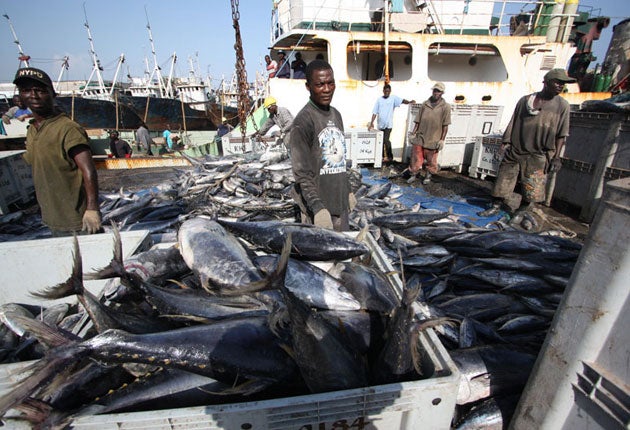Fresh triumph for ethical tuna fishing campaign

Your support helps us to tell the story
From reproductive rights to climate change to Big Tech, The Independent is on the ground when the story is developing. Whether it's investigating the financials of Elon Musk's pro-Trump PAC or producing our latest documentary, 'The A Word', which shines a light on the American women fighting for reproductive rights, we know how important it is to parse out the facts from the messaging.
At such a critical moment in US history, we need reporters on the ground. Your donation allows us to keep sending journalists to speak to both sides of the story.
The Independent is trusted by Americans across the entire political spectrum. And unlike many other quality news outlets, we choose not to lock Americans out of our reporting and analysis with paywalls. We believe quality journalism should be available to everyone, paid for by those who can afford it.
Your support makes all the difference.Letters from customers and embarrassing headlines have forced the last major British supermarket group to drop a destructive form of tuna fishing.
As the latest domino to topple in one of the most successful environmental campaigns in years, Morrisons told The Independent it would ban purse seining using fish-aggregating devices, or Fads, by the end of 2013.
Fads are man-made rafts that attract tuna and other species such as turtles and sharks – which are all scooped up in nets and killed along with the intended catch. In their place, Morrisons will switch to purse seining without fads and pole-and-line, a traditional method which minimises by-catch.
The move brings Britain's fourth-biggest supermarket into line with its competitors. Tesco and Asda announced similar promises earlier this year after a campaign by Greenpeace and the chef Hugh Fearnley-Whittingstall. In January, Greenpeace and Mr Fearnley-Whittingstall's "Fish Fight" complained that tuna brands were engaging in damaging fishing practices while telling customers they were kind to the marine environment. Before the campaign was launched, only Sainsburys, Marks & Spencer and Waitrose stocked 100 per cent own-brand tuna caught with the pole-and-line method.
On 10 January, two days before Greenpeace published a league table of eight tuna brands' sustainability, Tesco – which had been ranked last – said it would move to pole-and-line caught tuna by the end of 2012.
Britain's biggest tuna label, Princes, said four days later it would drop a claim on its labels about using fishing methods "which protect the marine environment and marine life". Greenpeace had submitted a dossier to the Office of Fair Trading, alleging the claim was misleading customers. In March, Princes and Asda agreed to phase out Fads by 2014. Announcing Morrisons' change, Steven Butt, head of corporate social responsibility, said the firm had been discussing the change with suppliers for months, but credited the campaign as being an "important factor". "It's galvanised the sector and it's raised awareness, which is a very powerful thing," he said, adding the supermarket had received many letters about it.
John Sauven, the executive director of Greenpeace, welcomed the "quite unprecedented" speed of change. He said: "One of the significant things about this is that shoppers see tinned tuna like they see tins of baked beans and you often see 'two for the price of one', and what we have been able to do through Hugh's work and from some good campaigning is to get people to understand the value of life in our oceans, and that this is a massive resource – and that it's not just overfished, but fished unsustainably.
"The UK is the second-biggest tinned tuna industry after the US – changing that supply is incredible after a couple of months. It will have a knock-on effect."
Mr Fearnley-Whittingstall, who will screen a follow-up programme in June, said: "It's been one of those really interesting campaigns where concerted effort and a bit of a pincer movement between Greenpeace and Fish Fight has got an initial good result with the Tesco commitment a couple of months ago, and we have been able to apply the pressure systematically on the rest of the market. As with so many ethical consumer issues you get to the point where there the ethical part of the market starts to be the majority and the unethical becomes the minority." More turtles, dolphins and sharks will be saved because of the changes, he added.
Join our commenting forum
Join thought-provoking conversations, follow other Independent readers and see their replies
Comments